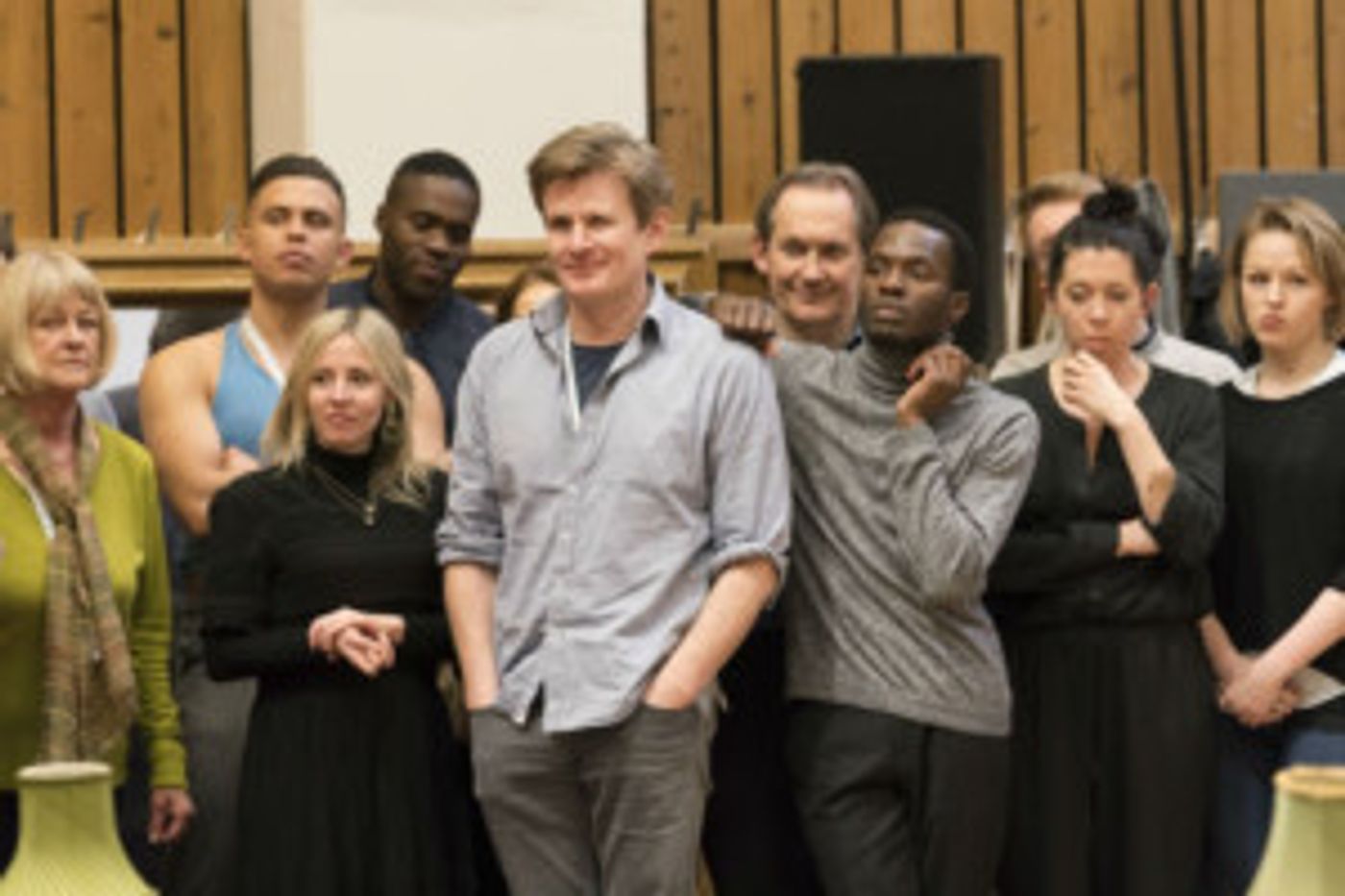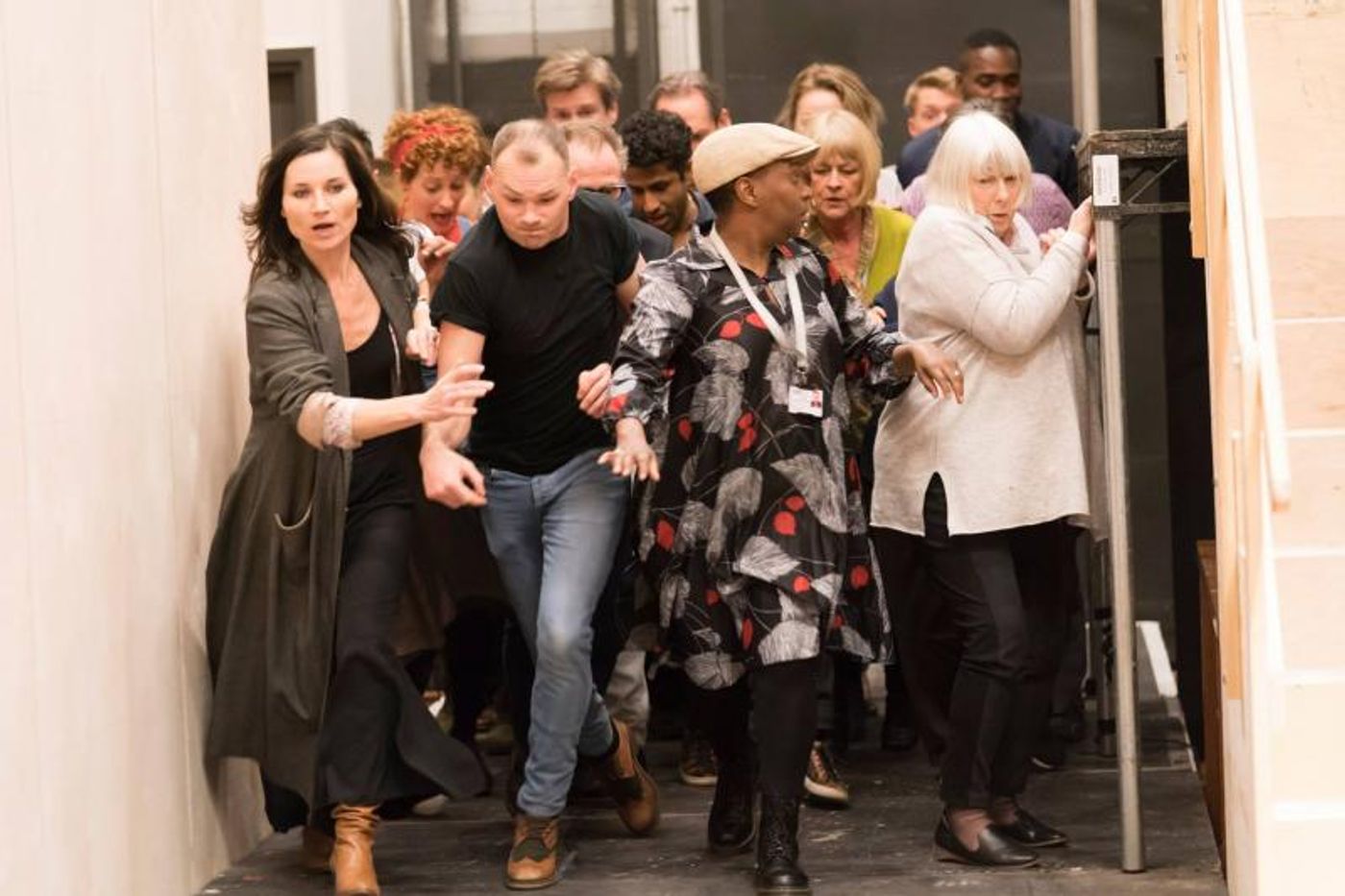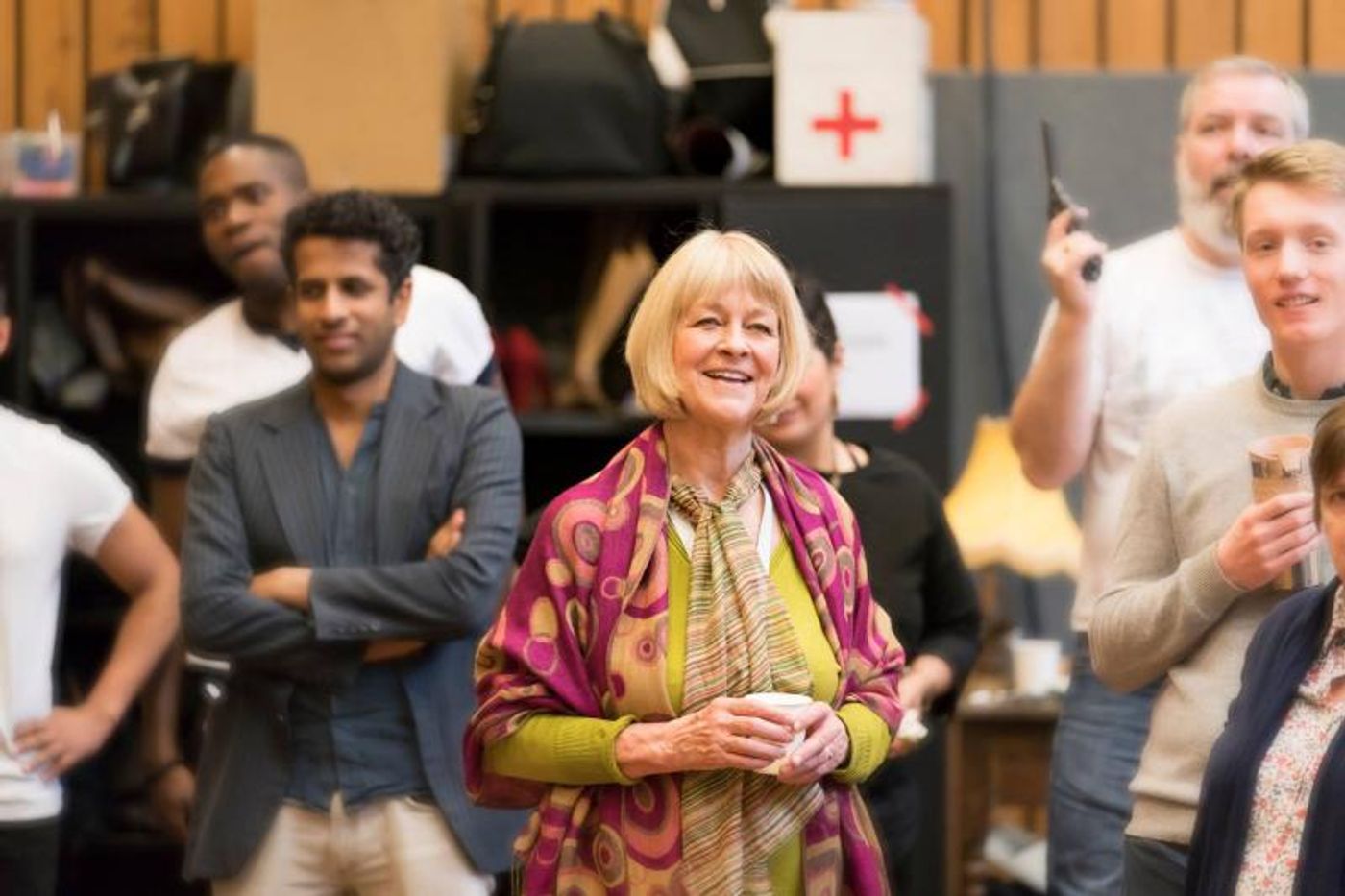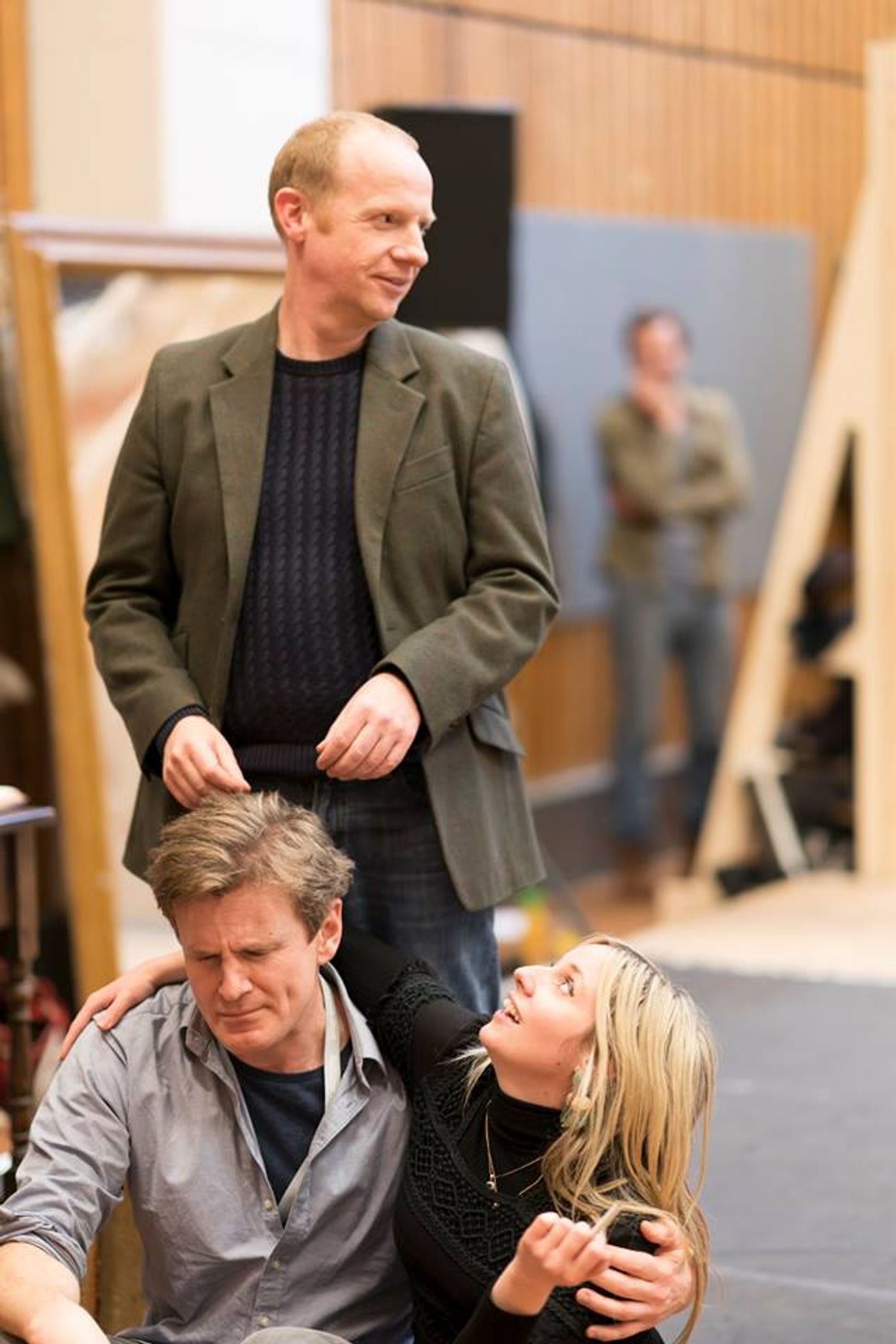Interview: Charles Edwards Talks ABSOLUTE HELL

Two decades after it was previously performed at the National Theatre, Rodney Ackland's Absolute Hell returns to the very stage it played back then: the Lyttelton.
With a career spanning over two decades too across stage and screen, Charles Edwards is no stranger to the National Theatre. Catching up during rehearsals, Charles spoke to us about his "innate connection" to the play, and reveals the greatest challenge he's faced in his career (which came only last year).
What was your first experience with theatre?
I know exactly what it was. The first thing I saw was The King and I with Yul Brynner and Virginia McKenna at the Palladium. I remember distinctly the angle of the stage from where we were sitting, the velvet seats and how exciting it was. There was a kind of spark lit then.
So it was always acting then, which you wanted to pursue?
It was. But you know in another life, I would also like to do stage design. That or directing something too. But I'm not sure if I'm quite fluid enough to run a room.
What was your journey to becoming an actor?
Well, initially I was quite shy about it and a bit cautious. But once I started to do school plays, my academic work slightly went down the pan but I discovered that I really enjoyed it.
Then I did the National Youth Music Theatre for two years, once I'd left school. That included doing a show at the Edinburgh Festival, which then transferred to Sadler's Wells. And then I auditioned for two or three drama schools and got into Guildhall and then started.
What's been the biggest challenge you've faced in your career?
The biggest challenge would probably have been last year actually. I was in Australia doing My Fair Lady for a few months. And I loved Australia, I had a ball. But I had never done a musical of that scale.
I'd done one musical in my life before that. It was at the King's Head years ago, with one guy on the piano. This had a 40-piece orchestra. It was a big deal and it was the 60th anniversary production. It had all of the original Cecil Beaton costumes and the sets. And they got Julie Andrews to direct it, which was an extraordinary experience to work alongside her.
So it was a challenge. I was scared, really scared. Not because I didn't think I could do it, but because I'd never done it. But I think things like that are always good to do. Outside your comfort zone is where you often have the most fun.
What advice would you give to anyone facing a similar challenge?

Trust that you can do it and in your self-belief. Because everything about this business will try to erode it.
We set ourselves up to be pelted with eggs, you've got to accept that. As you wipe the egg away just think, "No, I can do it". Try and remember the confidence that you had when you first wanted to do it.
Is there a role you'd like to take on, now that you've got musicals under your belt?
Oh, do you know what? I'd love to do more musicals.
Higgins obviously was more of a speaky-singy role, but I sang more of it than I thought I was going to. And I had a lot of encouragement. "Oh, you've got a nice voice!" And I was going, "Really?!" I used to think I could sing okay. But then I think someone said, "Oh, you can't sing", which of course makes you clam up and immediately worry about singing.
So I've never been hugely confident in it and to have people say, "It sounds pretty good". You go, "Oh, okay!" That's all it takes, someone to give you a bit of a boost.
Moving on to Absolute Hell, this isn't your first time at the National, is it?
No. I mean the last few years for me have essentially been the National and the Globe, apart from that trip abroad. Here is where I like to be.
The South Bank calls you back!
Quite! And it's lovely to walk to work, walking across that bridge to work everyday. It all feels very essential to London.
I'm fortunate in that I now feel very comfortable with both the Olivier and the Lyttelton. And it'll be great to return again. I felt very comfortable the last time I was in the Lyttelton, a couple of years ago. That was a very sparse set for Waste, very minimalist.
What can you tell us about the vision and staging of Absolute Hell?
Well, it's a very big set for a very big play. The play has 25 characters and it will be a very busy stage with a lot of people on it.
It needs to be kept animated at all times. And the spirit of that club in 1945 has to be ingrained, because the Lyttelton is a big stage and it's got to keep moving. There'll be a lot of dancing, a lot of singing, and a lot of energy.

of Absolute Hell
Were you familiar with the play?
I felt quite an innate connection to it. I remember seeing the TV film years ago, and it had quite an effect on me. I used to look at that film and I knew it was a National Theatre production (even though they did the movie before they did it at the National). But I used to think, "If that's what the National is like, then that's what I want to do".
So for me, it's always sort of been a representation of what being here would be like. And as soon as I heard they were doing it, I was very keen to be involved.
How did you prepare for rehearsals? Did you rewatch the film?
No and I haven't seen it in about two or three years. It's still there though, I remember it clearly.
But before rehearsals started, our director Joe Hill-Gibbins wanted people off book quite quickly. And I learnt it, which is sort of what I tend to do now. I didn't used to do that, I resisted it a bit. But I think it's actually a good thing to do. Learning it before, you can sort of feel, "Oh no, I'm going to miss out on a part of the process".
But actually, if you know the lines, then you can play with it. You relearn it in a way, because it's not just you walking up and down in your kitchen; you're faced with the person you're playing opposite. So I don't believe that changes the process; it's just rewiring it.
Can you tell us about the role you play?
Hugh Marriner is struggling. His relationship is failing, his career is failing, he's a drinker. He spends a lot of time at this club and he's very close with Christine, who's the boss of this club.
He's a desperate character and he remains pretty much like that throughout the whole thing. He's a very sensitive and erratic person: he has episodes of being absolutely at the nadir and episodes of reasonable elation. Chaotic, that's how I'd describe him. Much like Rodney Ackland, who I believe was too.
What relationships are proving crucial to your character?
The bottle! No, the crucial relationship is with Prasanna Puwanarajah, who is my partner in the play, Nigel. And Hugh's mother as well, she is very important to him although he pushes her away a lot.
And we talked a lot about whether these characters would function with each other, out of the environment of the club. But without ruining the play, there is a point when it's all gone. You do wonder what's going to become of all of them, because they do function at their "best" within this little club.

When Absolute Hell was first performed in 1952, it was described as "a libel on the British people". What can audiences today expect?
First of all, I do believe it is a tremendous play. The writing is just beautiful.
I know Rodney revised it in 1988. It was originally called The Pink Room and it was done in the 50s, and then Terence Rattigan took it into the West End. But it was a flop because of people like that who said that. And apparently Rattigan couldn't bear the smell of failure...
I think it's because it was challenging. It challenged the war which had just finished, and people were very sensitive about that. And patriotism, what the war has done to people. It challenges the political system, the view of sexuality.
And he writes those issues very well and very sensitively. The writing is just lovely to perform, because for a play for that period, it's so naturalistic and conversational. And for an actor, it's just a joy to play.
Finally, why should people come and see Absolute Hell?
As I've said, it is one of the best plays I've ever read. I wouldn't say it's neglected, because it had its sort of resurgence and when it was rediscovered at the Orange Tree. And Rodney was still alive then and rewrote certain sections of it.
When you get writing like that, it just makes the actors better, it makes everyone better. And I think in this production, you'll see a really terrific cast at the top of their game.
And on stage it'll be a lot of fun. Singing, dancing and lots and lots of drinking.
Any real booze on stage though?
Well...
You'll see how press night goes!
Well, we've been discussing the possibility of actually drinking what we're supposed to be drinking at one point. I mean, my character drinks God knows how much during the show! Whiskey and ginger ale is what he drinks, but I don't like whiskey. So we'll see.
Absolute Hell at the National Theatre 18 April-16 June
Photo credit: Johan Persson
Videos

